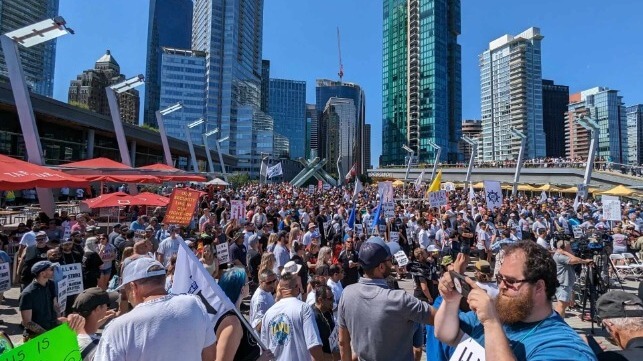ILWU Canada Votes Down Second Labor Agreement, Negotiates Third

The rank-and-file membership of the International Longshore and Warehouse Union's Canadian branch (ILWU Canada) has voted down a government-crafted labor agreement that would have raised their wages by about 19 percent, according to the BC Maritime Employers' Association (BCMEA). ILWU Canada's negotiators and leaders had recommended a vote in favor of the deal, which was the second iteration of a "final" agreement negotiated with federal mediators.
The latest breakdown did not last long: In a rapid-fire turnaround, negotiators for ILWU Canada and the BCMEA announced another settlement agreement late Sunday, heading off disruption. The new deal now goes to union membership for another vote.
Union members' decision to vote down the previous agreement reignited calls for the Canadian government to impose a resolution. Two previous rounds of labor action brought Canada's busiest container ports to a standstill for two weeks earlier this month.
The Greater Vancouver Board of Trade, the largest business association in western Canada, said that it was "shocked and disappointed" by the rejection of the deal. The previous port shutdowns curtailed production at pulp mills, mines, and other businesses that depend on supplies shipped through Vancouver and Prince Rupert, and the board warned of inflationary effects if the strike resumes.
"An agreed-upon deal has now been rejected twice by the union. It is now time for the federal government and opposition parties to intervene to ensure that our ports stay open," said Bridgitte Anderson, head of the Greater Vancouver Board of Trade. "It is also clear that the federal government needs additional tools to facilitate lasting agreements when labor disruptions affect the entire economy.”

that matters most
Get the latest maritime news delivered to your inbox daily.
Federal Labor Minister Seamus O'Regan appeared to agree. On Saturday, O'Regan said in a statement that he has asked the Canada Industrial Relations Board (CIRB) to rule on whether it is impossible for the two sides to reach negotiated agreement. If the CIRB makes this determination, they may impose a new collective agreement or impose a binding arbitration process, whether the union approves it or not. He left open "all options and eventualities" to end the dispute, signaling openness to a legislative back-to-work order.
The CIRB sat down with ILWU Canada and the BCMEA shortly after, and a third agreement was announced Sunday night. The deal must still pass muster with ILWU rank-and-file members.
